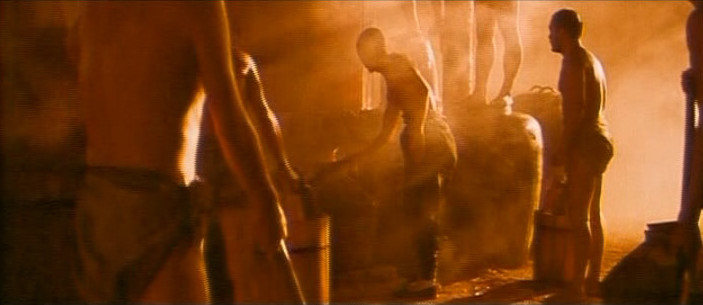 It's probably now hard to imagine that Zhang Yimou, artistic director of the opening ceremony of the 2008 Olympic Games and preferred film maker of the Chinese Communist establishment, was once its film industry's enfant terrible. He started as the DoP on Chen Kaige's debut feature 'Yellow Earth', considered the first modern Chinese film or at least the first prominent film to emerge from the Beijing Film Academy which reopened in the late 1970s. Zhang Yimou then progressed to directing his own features, and his debut 'Red Sorghum' sets the benchmark for the fine films he made in the early 1990s. His masterpieces 'Ju Dou' and 'Raise The Red Lantern' would soon follow 'Red Sorghum' and in many ways explore similar themes. Each of the three films features Zhang Yimou's muse, Gong Li, as a young woman coerced into marriage to an older man. Each film is set in the pre-Communist past, usually the 1920s/1930s. These two factors are important if we want to consider this trilogy as acting as allegories on the Chinese present. Some critics have read these films, with their portrayal of a patriarchal and repressive society, as a reflection of the modern China, but obviously Zhang Yimou could not be too overtly critical of the present regime, hence setting these films in the past. Not that he didn't fall foul of the authorities, who banned his films. This makes his rehabilitation at the hands of the same authorities all the more intriguing.
It's probably now hard to imagine that Zhang Yimou, artistic director of the opening ceremony of the 2008 Olympic Games and preferred film maker of the Chinese Communist establishment, was once its film industry's enfant terrible. He started as the DoP on Chen Kaige's debut feature 'Yellow Earth', considered the first modern Chinese film or at least the first prominent film to emerge from the Beijing Film Academy which reopened in the late 1970s. Zhang Yimou then progressed to directing his own features, and his debut 'Red Sorghum' sets the benchmark for the fine films he made in the early 1990s. His masterpieces 'Ju Dou' and 'Raise The Red Lantern' would soon follow 'Red Sorghum' and in many ways explore similar themes. Each of the three films features Zhang Yimou's muse, Gong Li, as a young woman coerced into marriage to an older man. Each film is set in the pre-Communist past, usually the 1920s/1930s. These two factors are important if we want to consider this trilogy as acting as allegories on the Chinese present. Some critics have read these films, with their portrayal of a patriarchal and repressive society, as a reflection of the modern China, but obviously Zhang Yimou could not be too overtly critical of the present regime, hence setting these films in the past. Not that he didn't fall foul of the authorities, who banned his films. This makes his rehabilitation at the hands of the same authorities all the more intriguing.'Red Sorghum' uses a narrative tool that Zhang Yimou would also use in 1999's 'The Road Home'; an unseen narrator tells the story of his grandparents. As mentioned, Jiu'er (Gong Li) is a young woman sold into marriage to an old, leprous winery owner in exchange for a mule. The opening scenes which explain her misery and confusion at these set of events is stunningly done. On her way to her wedding, she is carried in a sedan chair. Zhang Yimou uses extreme close-ups on her face, showing her intense sadness, but uses colour in an exceptionally spellbinding fashion. The chair is covered in red fabric, thus the interior is consumed by a bright and suffocating deep red. The use of such colour recurs in this film frequently, reflecting the colour of the wine Jiu'er produces. This isn't the sole use of colour; using expansive long shots and the natural environment, Zhang Yimou captures the gorgeous yellow and orange backdrops.
Jiu'er's marriage is ominously cut short when her husband is murdered. Although we don't know exactly by whom, the narrator suspects it's his grandfather (Wen Jiang), a hired hand who aided Jiu'er when she was attacked en route to her wedding. He later rapes her in a field, though Jiu'er's reaction seems rather submissive. Between them, they revive the ailing winery, much as Gong Li and her lover do in 'Ju Dou'. Until this point, 'Red Sorghum' is something of a fable but enters much more gruesome and graphic territory with the Japanese invasion of China, and Zhang Yimou doesn't shy away from highlighting the atrocities that occurred, which claims Jiu'er and her lover as its victims. This narrative twist comes so far out of nowhere that the film seems rather disjointed when viewing its second half, like it belongs to another film entirely. And that's probably why 'Red Sorghum' doesn't satisfy as much as Zhang Yimou's next two films with similar themes, although of course as debuts go, 'Red Sorghum' is exceptionally impressive and laid the groundwork for the following masterpieces. It's incredibly moving and aesthetically breathtaking (just look at that final eclipse scene). Although 'Hero' and 'House of Flying Daggers' were perfectly good, one wonders whether Zhang Yimou's current place in the bosom of the Communist establishment will prevent him from making films of this quality again. 4/5
No comments:
Post a Comment